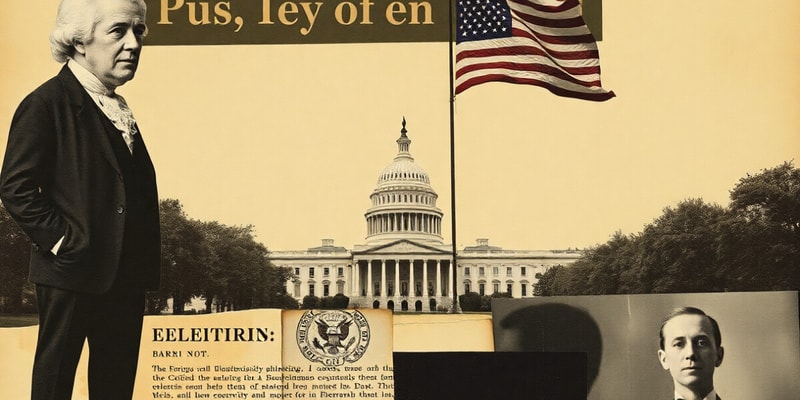Podcast
Questions and Answers
What does Jefferson believe is a key element of the human constitution?
What does Jefferson believe is a key element of the human constitution?
According to Jefferson, what is the relationship between the right to property and natural wants?
According to Jefferson, what is the relationship between the right to property and natural wants?
What does Jefferson state about the actions of a majority oppressing an individual?
What does Jefferson state about the actions of a majority oppressing an individual?
What does Jefferson suggest is the only alternative to law in maintaining order?
What does Jefferson suggest is the only alternative to law in maintaining order?
Signup and view all the answers
Which principle does Jefferson identify as the fundamental law of society?
Which principle does Jefferson identify as the fundamental law of society?
Signup and view all the answers
Study Notes
Jefferson's Political Philosophy
- Foundational Principle: Jefferson believed in the inherent good of humanity, but recognized the potential for individuals to act against the good of society.
- Role of Government: Government is a necessary evil to maintain order, protect property, and enforce contracts, but it can become tyrannical if unchecked.
- Ideal Government: Jefferson's ideal government is limited in scope and power, empowering citizens directly in local affairs and through representative elections.
- Checks and Balances: Jefferson favored the separation of powers and the principle of checks and balances to prevent corruption and protect individual liberty.
- Fear of Tyranny: Jefferson was particularly concerned about the concentration of power, viewing both unchecked legislative and executive authority as dangerous to individual liberties.
- Economic Philosophy: Jefferson believed that free markets and individual initiative would lead to wealth creation, while competition would ensure a fair distribution of goods.
- International Relations: Jefferson believed in a balance of power between sovereign nations, promoting commerce, cultural exchange, and peace through self-interest.
The Limits of Laissez-Faire
- Jefferson's Era: The “laissez-faire” doctrine of minimal government intervention was appropriate in Jefferson's time when the world was less interconnected.
- Global Interdependence: In a modern world characterized by interconnected economies, rapid social change, and powerful corporations, unchecked individual and national self-interest can lead to social conflict and global instability.
- Need for Government Intervention: To achieve social harmony and prevent conflict, government must actively intervene to regulate markets, address social inequalities, and foster international cooperation.
In conclusion, the evolution of political and economic ideologies reflects society's changing values. The "laissez-faire" doctrine, suitable for Jefferson's less interconnected era, now requires reconsideration in our globalized world, characterized by interdependent economies and rapid social change. The influence of powerful corporations and complex international relations underscores the need for a balanced approach, combining individual freedoms with regulatory measures to ensure stability and equity, highlighting the importance of governmental involvement in addressing contemporary challenges.
Studying That Suits You
Use AI to generate personalized quizzes and flashcards to suit your learning preferences.
Description
Explore the key principles of Thomas Jefferson's political philosophy, including his views on the role of government, checks and balances, and individual rights. Understand how Jefferson's beliefs on human nature and the potential for tyranny shaped his vision for an ideal government.




